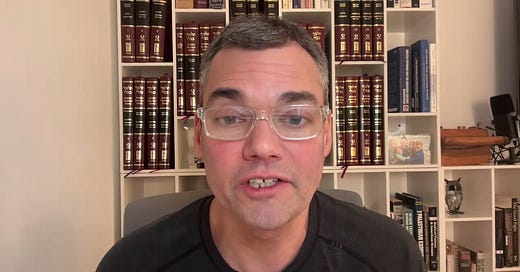My new book, Being Jewish After the Destruction of Gaza, is (still) on The New York Times Bestseller List.
You’ll find a list of book-related events, interviews and reviews below.
I’m happy people are reading my book. But I know that many talented Palestinian authors don’t get the same attention. So, I hope people who buy my book also buy one by a Palestinian author. For instance, the latest work by the essayist Raja Shehada, What Does Israel Fear from Palestine?
I hope readers also donate to people in Gaza. For instance, Hossam and Mariam Alzweidi, who were severely injured along with their four children by Israeli bombs and have been displaced ten times since October 7th. They’re trying to raise the money to seek medical care in Egypt. Their GoFundMe page is here.
Friday Zoom Call
This Friday’s zoom call, for all paid subscribers, will be at 1 PM Eastern on Friday, our regular time. Our guest will the Guardian columnist and novelist Jonathan Freedland. I’ve been looking for opportunities to discuss my book publicly with Jews who disagree with my criticisms of Israel, and it’s been hard. Almost everyone I’ve asked has said no. I’m grateful that Jonathan is an exception. He’s critical of Israel himself but still disagrees with aspects of my book. I’m looking forward to hearing those criticisms this Friday.
Friday’s zoom call is for paid subscribers.
Book Tour
(We’ll update this every week.)
On Monday, February 17, I’ll be speaking at San Diego State University.
On Tuesday, February 18, I’ll be speaking with UCLA historian David Myers at the Lumiere Music Hall in Los Angeles. (The venue was changed after the Skirball Cultural Center cancelled the event).
On Monday, February 24, I’ll be speaking with Washington Post columnist Karen Attiah at Politics and Prose bookstore in Washington, DC.
On Monday, March 3, I’ll be speaking with Professor Atalia Omer at Notre Dame University.
On Tuesday, March 11, I’ll be speaking at T’chiyah synagogue in metro Detroit.
On Tuesday, March 18, I’ll be debating an old classmate, Michael Rubin of the American Enterprise Institute, on the proposition “The oppression of Palestinians in non-democratic Israel has been systematic and profound” at the Soho Forum in New York.
On Monday, March 24, I’ll be speaking at the University of Vermont.
On Tuesday, March 25, I’ll be speaking at Middlebury College.
On Wednesday, April 9, I’ll be speaking at United Parish in Brookline, Massachusetts.
Book Interviews
Last week, I spoke about Being Jewish After the Destruction of Gaza with The New Yorker, The Forward and Rumble. And in a public conversation sponsored by Jewish Currents with Ta-Nehisi Coates.
The book was reviewed in The Financial Times, Jacobin, the Sydney Morning Herald and Good Faith Media.
Sources Cited in this Week’s Video
Dan Senor’s podcast conversation with Israeli journalists Nadav Eyal and Amit Segal.
Amos Harel in Haaretz on Israel’s new war plan.
Finance Minister Bezalel Smotrich says “Preparations have begun with the Americans for implementing voluntary migration. I estimate that migration will begin within weeks.״
Things to Read
(Maybe this should be obvious, but I link to articles and videos I find provocative and significant, not necessarily ones I entirely agree with.)
In Jewish Currents (subscribe!), I reviewed the antisemitism reports recently issued by task forces at Columbia, the University of Pennsylvania, UCLA, and the University of Washington.
David Brooks on Trump and Musk’s reign of terror and incompetence inside America’s government.
In The New Yorker, Mosab Abu Toha outlines a plan for Gaza’s reconstruction.
In the London Review of Books, Alex de Waal discusses Israel’s use of starvation as a weapon of war.
See you on Friday, February 21,
Peter
VIDEO TRANSCRIPT:
When things are already really horrible, it’s often hard for people to imagine that they could get even worse. Perhaps it’s especially hard for people to imagine that if those people, like many White Americans, have kind of grown up in relatively comfortable and secure environments. But I think we need to face the very real possibility that, in the weeks to come, Israel will renew its military assault on Gaza, that the ceasefire will end, and not just that Israel will renew its military assault, but that that military assault would be more ferocious, more savage than anything we have seen so far. And I want to suggest why I think there’s a real possibility of that terrible prospect.
One of the podcasts that I listen to is a podcast by a guy named Dan Senor called Call Me Back. Now, Dan and I kind of morally operate in really, I would say, fundamentally different kind of universes. I mean, we see Israel-Palestine in just fundamentally different ways. But I get a lot from listening to his podcast because Dan is very, very plugged in in Israeli political and national security circles. And he has guests on who are very, very plugged in.
And I think it’s really important for anybody, regardless of your political views, to not just listen to people who agree with you, but to listen to people who disagree with you because they often are part of a discourse that you might be inclined to overlook or not take seriously, but that actually is really, really important. And especially, given that this is a discourse that Dan is engaged in, which is operating off in a kind of near the highest echelons of the Israeli government and, especially under Trump, also the US government.
And so, in a recent episode, Dan was having a conversation with two very, very plugged in Israeli journalists, Nadav Eyal and Amit Segal. And one of the points they make is that they think it’s very unlikely that Benjamin Netanyahu would go to a second round of the ceasefire deal because his government is now down to 63 seats and an Israeli government needs 61 to stay in power. And Bezalel Smotrich, who was still in the government, the far-right finance minister, said he will leave the government if Israel doesn’t resume the war. He will leave the government if Israel goes to the second phase of the ceasefire. And that Netanyahu’s government could fall, in particular, because they have to pass a budget by early March, which would be very, very difficult to pass if there’s a rebellion inside their coalition. And beyond that, Netanyahu, if he went to an election this spring, would have to go into election having failed to deliver on his core promise of the war, which was to destroy Hamas. So, Segal and Eyal’s kind of view is that Netanyahu will look for an opportunity to not go to a second round of a ceasefire deal.
The second point that Nadav Eyal makes, which I think is really, really significant to understand, is the political impact of Donald Trump’s proposal for mass expulsion of Palestinians from Gaza, the political impact in Israel. That Eyal makes the point, which I think is a very reasonable point, that the only entity that actually could force Palestinians out of Gaza is Israel. The United States is not going to do it on its own. The United States is not going to send its own troops into Gaza to put Palestinians on buses and force them out. If Trump’s plan is going to go into effect, it will have to be that Israel does that work.
And in a sense, what I think Nadav Eyal suggests on Senor’s podcast is that what Trump has done by saying that he wants the outcome of this war not to be the Palestinian Authority coming in, not to be a negotiated solution, but indeed to be the mass expulsion of Palestinians is essentially given a green light to Israel to wage a war in Gaza, which would be even more than the last war, a war aimed at mass expulsion. And this seems to fit what some people in the Israeli government are now saying.
So, Amos Harel, the longtime Haaretz writer, reported a couple of days ago that Israel’s defense minister, Yisrael Katz, had said that Israel would launch a new war in Gaza ‘exactly as the president promised.’ What does it mean to launch a new war exactly as the president promised? So, Harel quotes an Israeli Brigadier General Eival Gilady, who was head of the IDF Strategic Division, that he believes that Netanyahu has gotten a green light from Trump ‘for a very aggressive plan in Gaza. A focused Israeli offensive will cause large-scale death and destruction, along with curtailing humanitarian aid and will lead to Palestinians leaving the Strip.’ He goes on to talk about a plan that would lay siege to parts of the Strip, prevent the supply of humanitarian aid, and lead to ‘considerable destruction, if not total devastation of the areas in which the IDF will operate. Such tactics reek of ethnic cleansing.’
It is hard for a lot of people to imagine that Israel could fight a war in a more destructive fashion than it did for the first 15 months of this war. But remember it was then dealing with Joe Biden. Not that Joe Biden imposed costs on Israel. But that at least his administration was saying behind closed doors, we want you to try to be a little bit more restrained in your actions. The Trump administration, in a certain sense, has now said exactly the opposite. Not that we want you to be more restrained, but that we want you to create conditions for mass expulsion, which Trump has now said he believes in the interests of the United States, right.
And so, that seems to me a green light for Israel to resume the war in a way that is explicitly aimed at trying to create so much destruction in Gaza and permit so little humanitarian aid in as to try to force the population out. Of course, there’s still the question of whether you can force Egypt to go along with that, right. But that’s the other part of this element, given that Netanyahu has a political interest, it seems, in returning to military operations because otherwise his government would likely fall. And given that the Israeli assessment, understandably in a way, is that the only way you could implement Trump’s plan is if Israel created the expulsionary force from inside Gaza, and then you were able to get Egypt or Jordan or various other countries to agree to take some of these people. That I think, in a sense, what Trump’s musings may have really done is offered Israel a green light for an even more destructive, even more genocidal war than what we have seen before.
I hope I’m wrong. But listening to the Israeli journalists who follow and are very close to the Israeli political and national security establishment, that seems to be the way that Trump’s statements are being interpreted in Israel. And so, my fear is that we could be headed for something, God forbid, which is even worse than what we’ve seen before, unless there are forces around the world, and in the United States, that can somehow protest and try to stand in the way and block this. Because, on their own, Benjamin Netanyahu and Donald Trump, I think, will have no compunction about not just doing what Israel has already done in Gaza, but doing something even worse.











Share this post